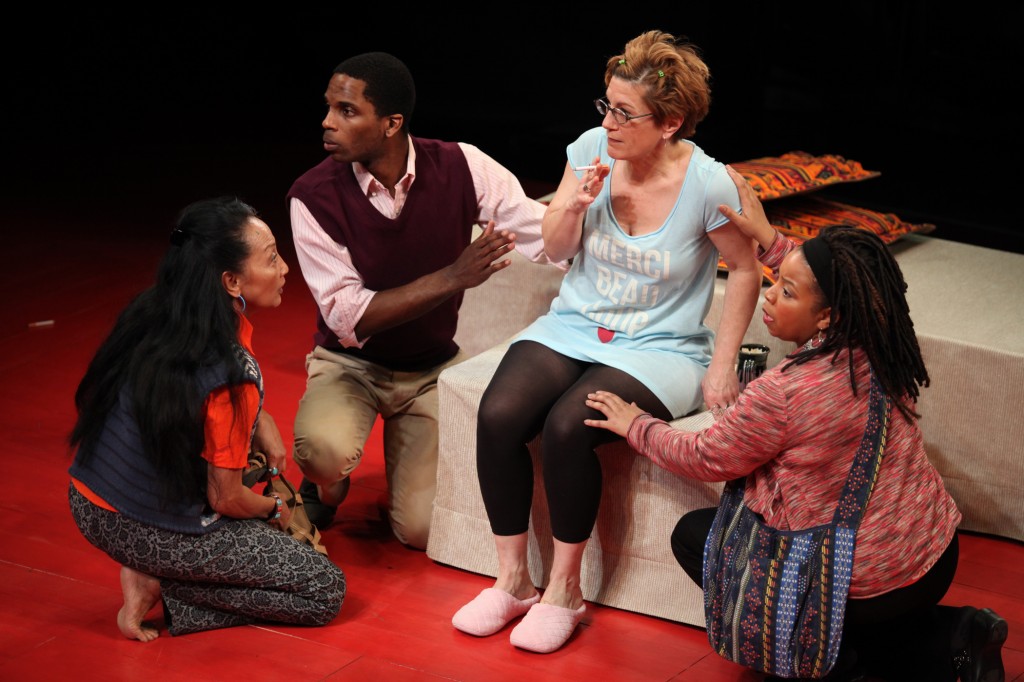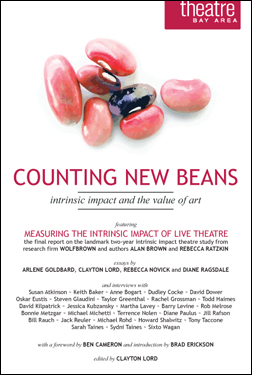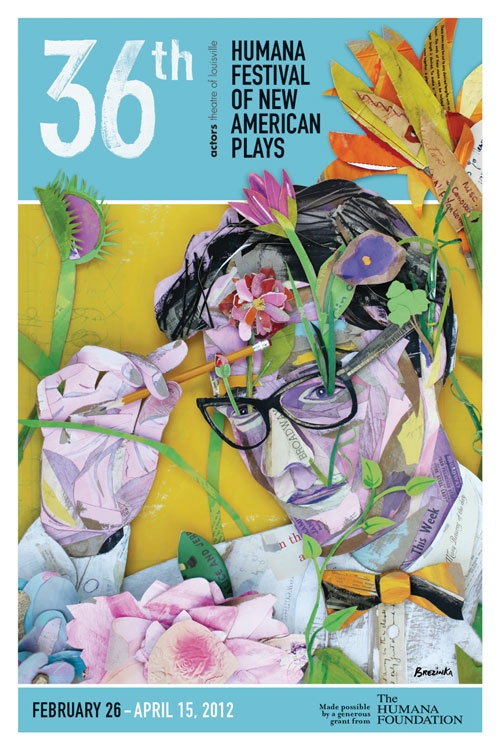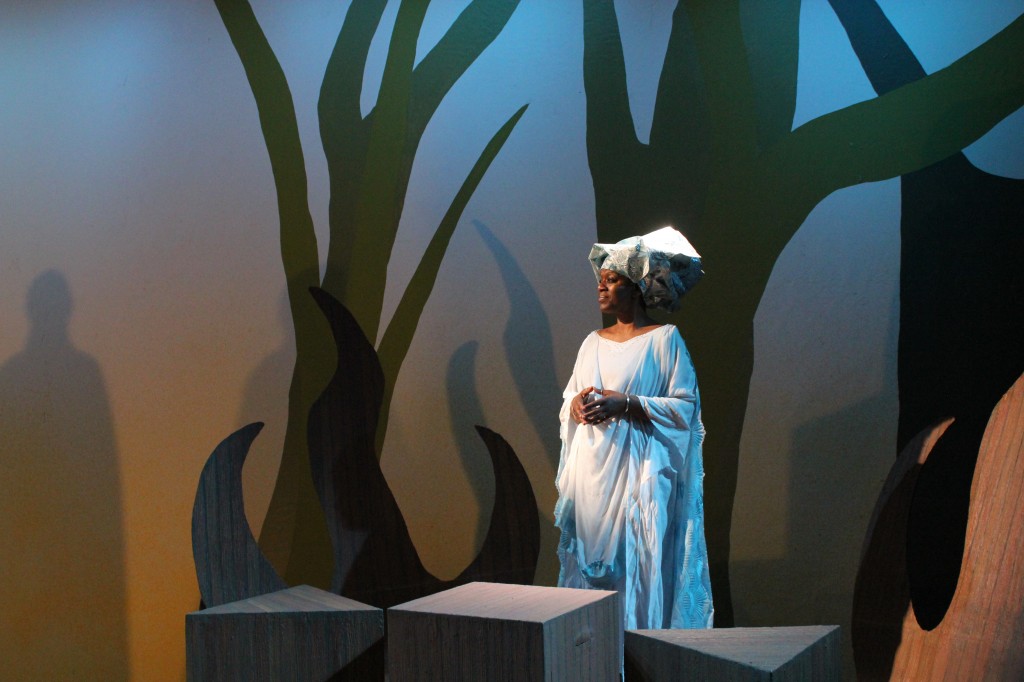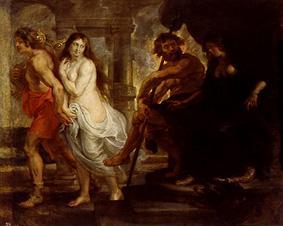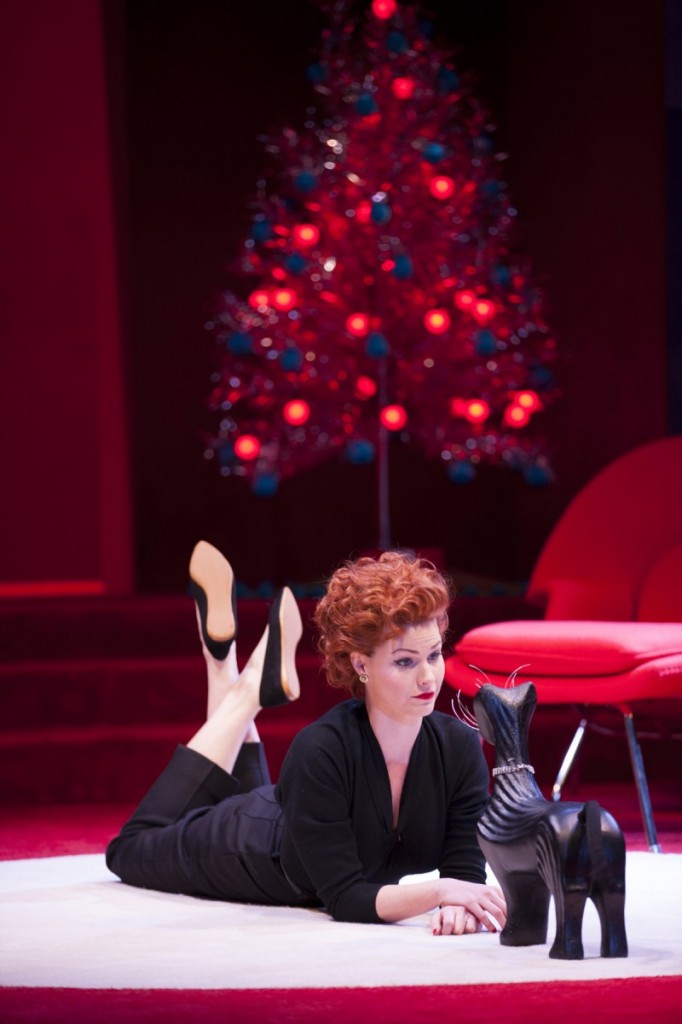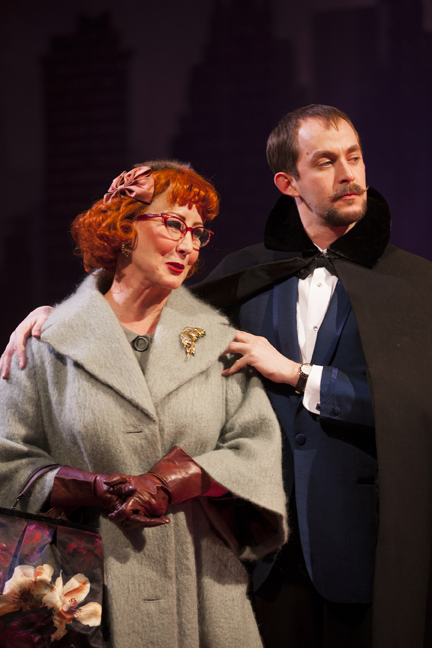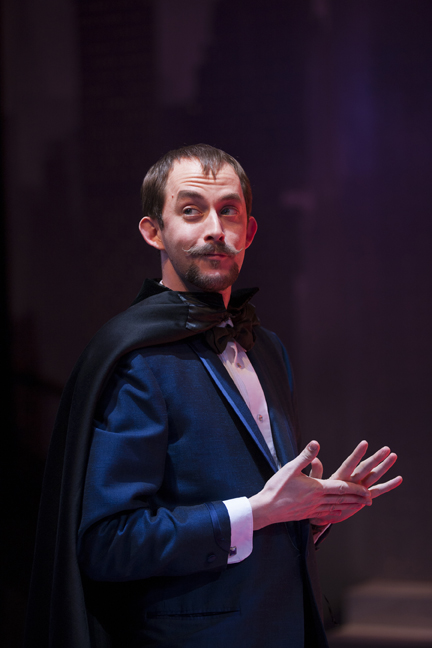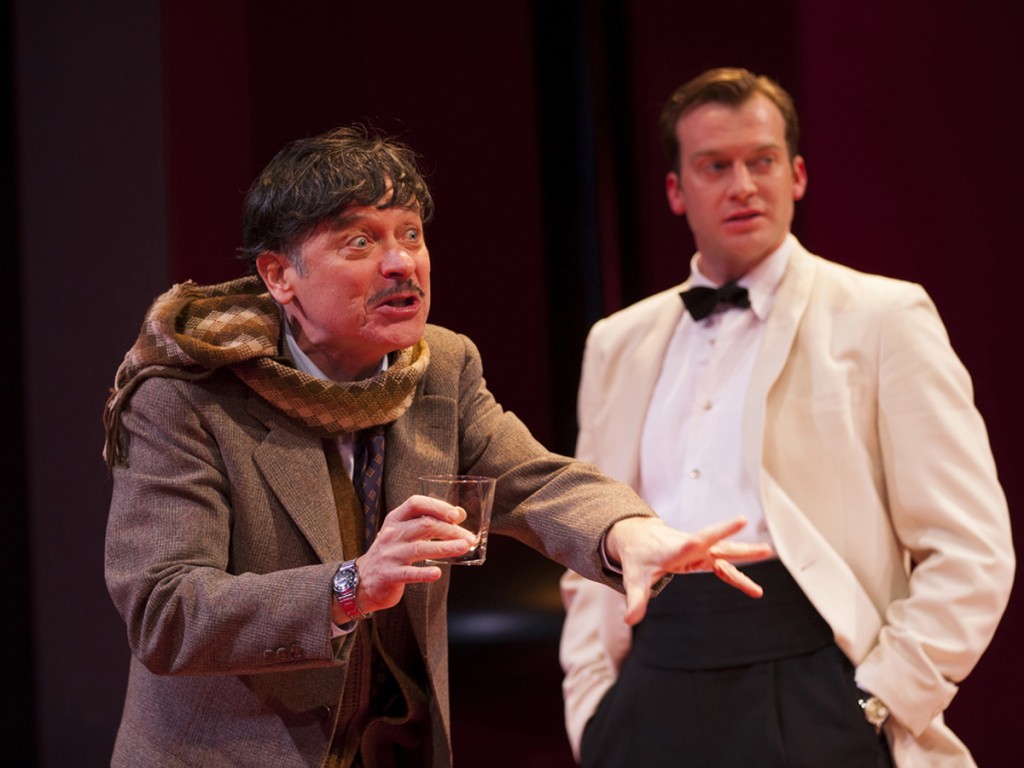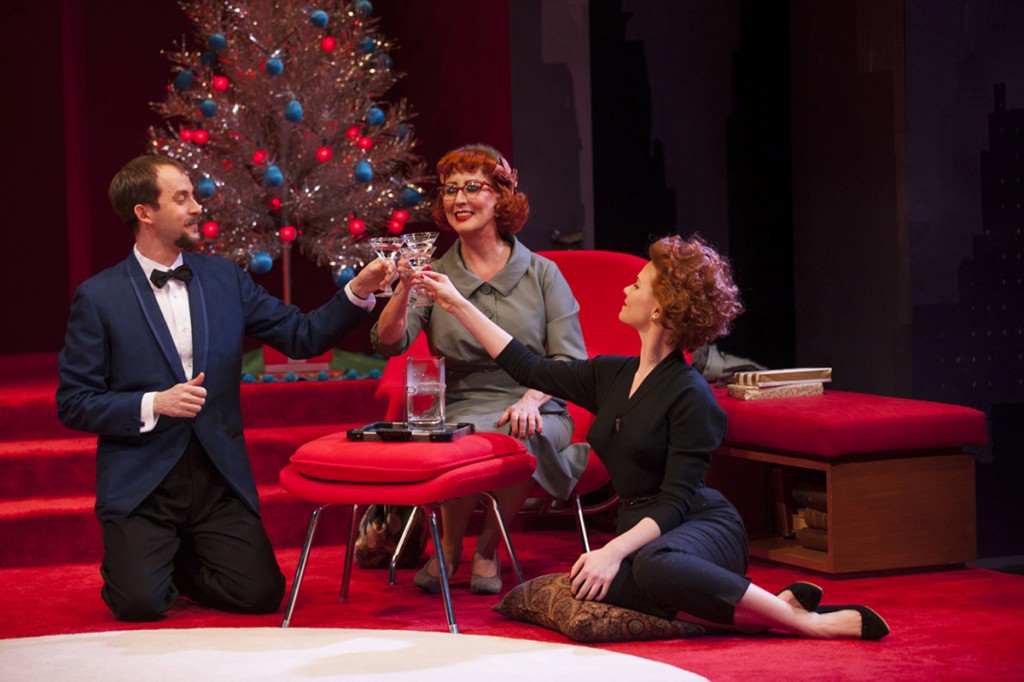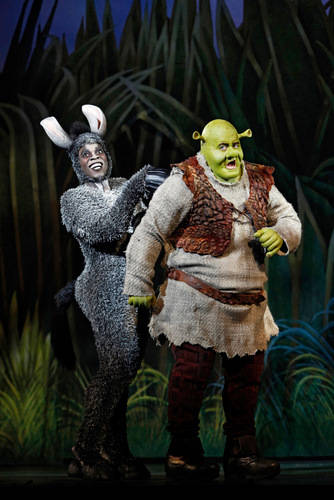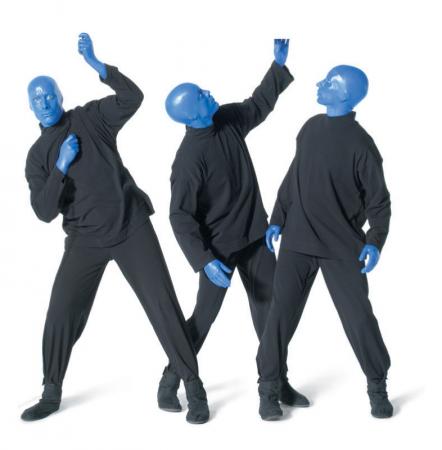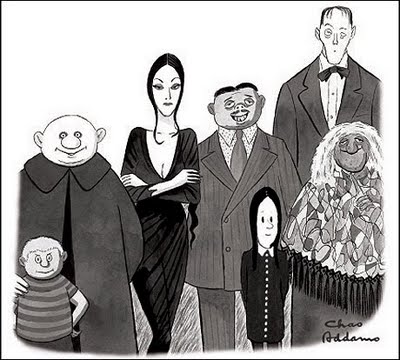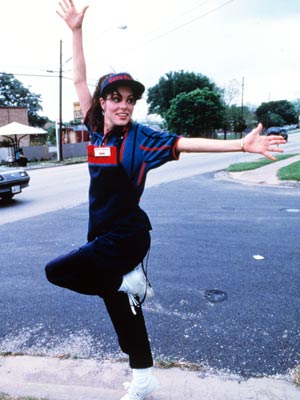
Paul Giamatti in the movie Ironclad, which is set in more or the less the same century as the first telling of the story which inspired Shakespeare's Hamlet. Paul Giamatti will play the melancholy Dane at the Yale Rep next year.
The Yale Rep has announced its 2012-13 season , and if it was announced two weeks from now I’d assume it was an April Fool’s jest cleverly designed to make me jump for joy and dance in the streets.
It’s an exceptional list of projects, all the more exciting for those of us (and I’ll admit that might be a rather special list) who have a familiarity with aspects of all the projects.
Many of the artists involved—Sarah Ruhl, Les Waters, Bill Camp, Robert Woodruff, David Adjmi, Rebecca Taichman, should be familiar to Repgoers from recent seasons. Others—Culture Clash, Paul Giamatti—haven’t stopped by in a while but did memorable work here before.
This season has breadth and variety and class, yet it also has a tone and a flow, an immediacy if you will, which should please subscribers and others who see the Yale Rep as their local theater and want to attend regularly.
If there’s any sort of linking theme to the far-flung season, it’s something about the relationship between stage and film. One play is about Hollywood’s influence on a small Irish town. Another is fashioned from a screenplay by a German genius who did both theater and movies well. Then there’s Giamatti, a noted film star, returning to his stage roots in the most famous play of all time.
With that urgency apparent—premieres, genre-pushing concepts, wild match-ups of directors and writers and performers—it’s going to be pretty damned hard to wait patiently for some of these shows to happen. The show which will surely suck up most of the press attention, Paul Giamatti as Hamlet, won’t happen until a year from now.
Well, the whole slate is worth the wait. Here it is, with commentary by me. (The Rep’s own take on their season, plus subscription info, is here):
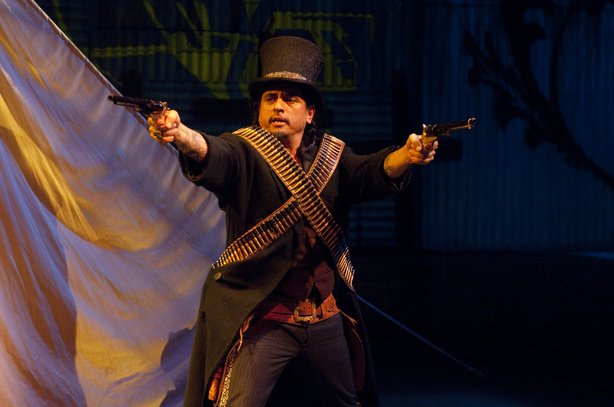
Richard Montoya as he appeared in American Night at the LaJolla Playhouse last year.
Sept. 21-Oct. 13 at the Yale University Theatre: American Night: The Ballad of Juan Jose brings elements of the Culture Clash troupe, the groundbreaking Los Angeles Latino comedy/drama ensemble, back to New Haven, where they did a special Elm City-centric edition of their Culture Clash in AmeriCCa revue in 2003.
Culture Clash co-founder Richard Montoya scripted American Night, which is credited as “developed by Culture Clash and Jo Bonney,” the New York director known for her regular collaborations with her husband Eric Bogosian and for her surehanded direction of new works Off Broadway and in the regional theater. Bonney directed Lil’s 80th at Long Wharf Stage II a few years ago.
Last summer the Oregon Shakespeare Festival used American Night to kick off The United State History Cycle, the festival’s nine-year cycle of dozens on new works based on pivotal moments in American history. American Night’s sold-out success made it the first OST show to rate the adding of extra performances.
Montoya’s a busy guy, continuing to work with his Culture Clash collaborators while also setting up solo writing projects. At the Theatre Communications Group conference in Los Angeles last summer, Montoya was pitching a new urban-realist play he’s workshopping, called Dopplegangers. That show had a small-scale premiere in September and will continue to be developed.
American Night’s playing at the Yale University Theatre, a conventional proscenium space. Casting hasn’t been announced: in the Oregon production, two of the three Culture Clash members—Montoya and Herbert Suiguenza—were in the cast.
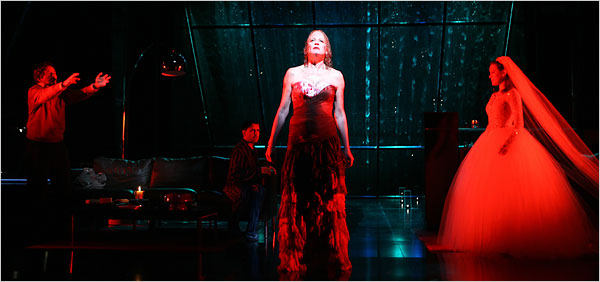
A scene from the previous Yale Rep show written by David Adjmi and directed by Rebecca Taichman, The Evildoers.
October 26 through Nov. 17 in the Yale Repertory Theatre space: The world premiere of Marie Antoinette, marking the return of zeitgeist-wrangling playwright David Adjmi to the site of his relationship-drama triumph The Evildoers back in 2008. In the meantime, Adjmi (already a much-hyped new talent when The Evildoers happened) has had Off Broadway acclaim with Elective Affinities and Stunning. Marie Antoinette is a co-production with the American Repertory Theatre in Cambridge, Mass., which gets to premiere this world premiere production first, in September. The director is Yale School of Drama grad Rebecca Taichman, who happened to direct the Rep production of The Evildoers.
Nov. 30 through Dec. 22 at the Yale Rep space: The word premiere of Dear Elizabeth, a new play by Sarah Ruhl. The last time a Ruhl play world-premiered at the Yale Rep, The Clean House as directed by Bill Rausch in 2004 was one of the most magical nights I’ve experienced in that place. Yale has since done several more Ruhl plays—Eurydice, Passion Play, a Yale School of Drama production of Orlando, a Yale Summer Cabaret production of Late: A Cowboy Song, undergrad productions of some of the above plus In the Next Room (or the vibrator play)—but it’s clearly time to launch another new one here. The director is Les Waters, who did Ruhl’s Eurydice at the Rep (a production rooted in an earlier one for Berkeley Rep in California) and also directed Ruhl’s “new version” of Chekhov’s Three Sisters for the Rep at the beginning of the 2011-12 season.

Jan. 25 through Feb. 16 in the Yale Rep space: Stones in His Pockets by Marie Jones, directed by Evan Yionoulis. A fascinating programming choice, since this script has been downgraded over the years to harmless community theater folderol. But I happened to see the show when it was first gaining international acclaim around 2000
Devised in Ireland in the late 1990s, Stones in His Pocket seemed ideal for the Edinburgh Festival, where it played in 1999, because of its two-person, multi-character cast and antic misbehavior. But it caught on much bigger than that, playing for three years in London’s West End, coming to Broadway in 2001, touring in a number of configurations and, once the rights trickled down to amateur and college companies, becoming a small-theater sensation. Director Evan Yionoulis, who actively rethinks and reinterprets any script she comes into contact with, is most commonly associated with heavy dramas —for the Rep, she’s done Shakespeare’s Richard II, Ibsen’s The Master Builder, Brecht’s Galileo and the 2010 world premiere of Kirsten Greenidge’s Bossa Nova. But she showed great instincts for broad comedy with her 2004 Rep production of Carlo Gozzi’s The King Stag. And I think her finest hour at the Rep was with the extremely coarse and extremely funny and extremely violent and just plain extreme George Walker play Heaven in 2000. There’s definitely a dark side to Stones in His Pockets, as foretold in the play’s very title, though it’s mostly a knockabout farce about a Hollywood film crew taking over a small Irish town and trying to heighten its “authenticity.” The beauty of the show is that two actors handle over a dozen roles between them. As a professor in the Yale School of Drama, Yionoulis knows how to work with actors; I’m suspecting Yionoulis has some great new ideas for this underappreciated script. Stones in His Pockets is has a shot at becoming a small-cast, high-energy, humble-beginnning regional theater hit along the lines of Charles Ludlam’s powerhouse The Mystery of Irma Vep.

March 15 through April 13 in the University Theater: Hamlet, starring Paul Giamatti, directed by James Bundy. When Paul Giamatti visited New Haven last April to accept the first “Louis” award from Mory’s restaurant, he reminisced about the shows he did as a Yale undergrad and as a grad student at the Yale School of Drama. What would it take, someone asked, for this celebrated film actor to return to the legitimate stage? “A whole lot of money,” Giamatti joked.
Now, I imagine the Yale can find a whole lot of money when it needs to, but I don’t think this is about that. I think it’s about Giamatti getting to play Hamlet, and reconnecting with James Bundy, who graduated from the Yale School of Drama directing program a year after Giamatti got his degree from its acting program. Bundy is of course now the Dean of the School of Drama, not to mention Artistic Director of the Yale Repertory Theatre who still regularly directs plays there, the most recent being the all-star A Delicate Balance revival and the all-African-American Death of a Salesman which starred Charles Dutton.
I was a fervent Paul Giamatti fan back in those hallowed early ‘90s—extraordinary times for the school, with Sanaa Lathan, Mercedes Herrero and Stephen DeRosa also on campus then). I remember how annoyed I got years later when Giamatti got a supporting role in Saving Private Ryan and Entertainment Weekly suggested that he’d be an unlikely choice for leading-man roles. A stupid remark, not only deemed ridiculous by Giamatti’s later successes in American Splendor, Sideways and John Adams, but already at that point a pointless remark since I had personally seen Giamatti excel onstage as Peer Gynt in Peer Gynt, as the lead journey in Carlo Gozzi’s fantasy odyssey Love of Three Oranges, and in a killer presentation of Chekhov’s The Bear directed by the legendary Earle Gister at the Yale Cabaret. Oh, Giamatti could be an excellent supporting player too, doing Jacques (“All the world’s a stage…”) in As You Like It on the Yale Rep stage in 1994.
I can hear the naysayers already: “Isn’t he too old to play Hamlet?” Nah. Giamatti is 45. Maybe he’s too old to play Romeo, but the idea of Hamlet as a fresh kid straight out of college is just one common concept of the character, not the definitive model. I’ve seen some pretty old Hamlets. Kevin Kline was 43 when he did Hamlet at the Public Theater in 1990, and few complained. Likewise, when John Barrymore did his psychologically groundbreaking Hamlet in 1922, he was 40 and stayed with the role for several more years. Besides, this is our first chance to see Paul Giamatti as Hamlet ever. If he’s doing it now, we should see it.
Hamlet will be next season’s designated “Will Power” production, meaning school groups will get to see and discuss it. (This year’s “Will Power” show is A Winter’s Tale; the “Will” in “Will Power” is a pun on Shakespeare’s first name).
April 26 through May 18 at the Yale Rep: The last show of the season is the world premiere of a new stage version of In Einem Jahr mit 13 Monden (In a Year With 13 Moons), the 1978 film by Rainer Werner Fassbinder. It’s directed by Robert Woodruff and stars Bill Camp, the co-adaptors who brought you Notes from Underground a couple of seasons ago. Woodruff also directed the mesmerizing stage version of the Ingmar Bergman film Persona a last season.
Like Bergman, Fassbinder was an accomplished theater artist who never entirely forsook theater for film. He wrote incessantly for both mediums, and had a loyal ensemble of actors and designers who followed him anywhere.
In Einem Jahr mit 13 Monden had special meaning for Fassbinder, a gay man and something of an artistic tyrant. The film was a way of coming to terms with the suicide of Fassbinder’s lover, Armin Meier, who appeared in nearly a dozen of the director’s film and TV projects. (Maier also inspired another key Fassbinder film, 1975’s Fox & His Friends.) Einem Jahr mit 13 Monden concerns a man who has undergone a sex change and is despondently revisiting places where s/he grew up, including a slaughterhouse and an orphanage.
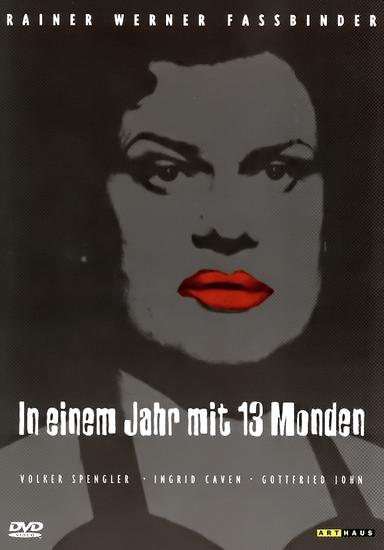
And that’s it. The whole glorious Yale Rep season. No “To Be Announced” slots. No fuzzy concepts with working titles. No obvious “I’ll believe it when I see it” longshots. A remarkable, rich, wide-ranging and potentially even revolutionary season, full of confident artists who continue to blast new trails and would rather die than get complacent. The Rep is their laboratory, and we get to watch the colorful explosions.
